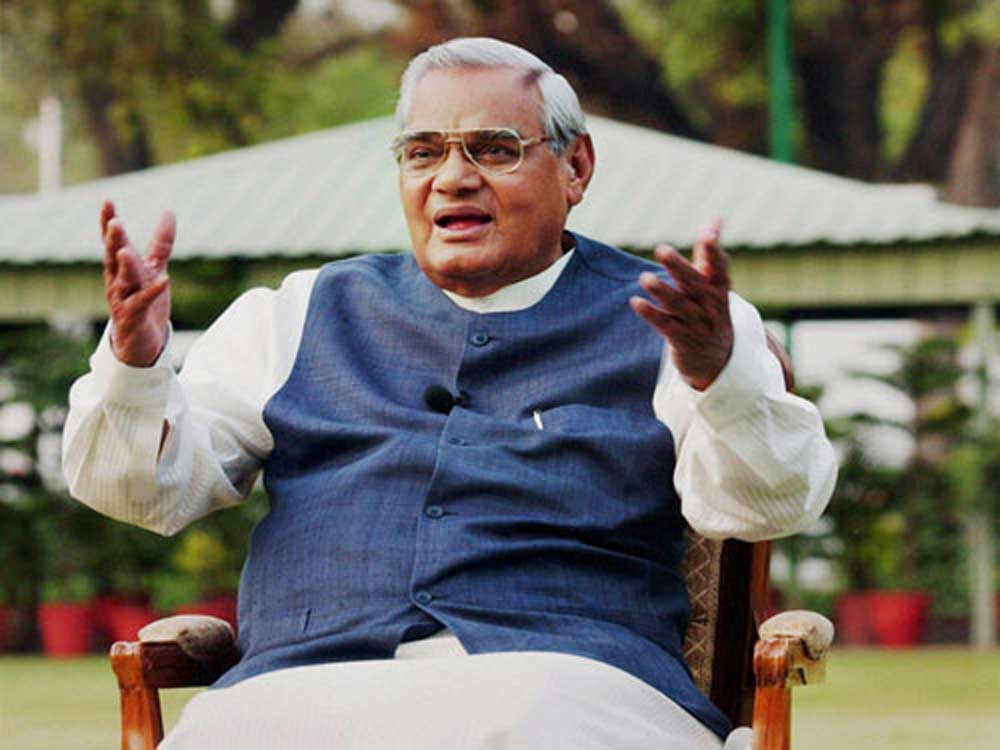Atal Bihari Vajpayee had a strategic vision for India, and it should be our polestar.
Prime Minister Atal Bihari Vajpayee’s appointment of Jaswant Singh as Foreign Minister and Brajesh Mishra as his National Security Advisor, were dead giveaways that despite the massive pressure on him by hard-line party stalwarts he, on matters relating to India’s foreign-security policies aka his strategic vision, would be his own man. He was always happy or at least patient enough to listen to those within and from other parties and ideological proclivities, of course. But as Pokhran II and the sanctions faced by India in its aftermath, the Lahore Bus Diplomacy outreach to Pakistan, his subsequent restrained aggression in the handling of the Kargil War and then following it up with hosting the Indo-Pak Agra Summit where the architect of the Kargil intrusions General Pervez Musharraf was his interlocutor exhibited, this was a statesman with a clear view of India’s emerging place in the global order after decades of so-called non-alignment against the backdrop of the Cold War. To be fair, it was Vajpayee’s dear friend PV Narasimha Rao who had already started the process of recalibrating New Delhi’s policies in the region and among the comity of nations by the early 1990s but he never had the charm, popularity and political capital Vajpayee had acquired when he finally ascended to the post of Prime Minister at the turn of the millennium. As part of his strategic vision, India’s soft power, which found expression not least in his own personality — poet, orator, bon vivant and gastronome — was also manifest in India’s civilizational ethos being an integral part of the projection of India. And had absolutely no issues in saying publicly that he would prefer to use the word Bharatiya rather than Hindutva to describe it, at least in part because the latter had more acceptability. But his was also a hard-nosed, realistic view of how the world viewed us — every Indian mission abroad was told to ensure primacy to commercial-economic affairs much to chagrin of some old-school wining-and-dining members of the diplomatic corps.
Vajpayee changed how the world viewed India by creating a sixth nuclear power in the world with Pokhran II; it was truly the great strategic leap in India’s post-colonial journey. That he had the nous to tell his Finance Minister to be prepared to deal with the blowback as vicious sanctions against Indian were put in place by Western powers and their allies but not to worry about his position because he would back him to the hilt even while he deployed Singh and Mishra to contain the diplomatic and security fallout showed his mastery of the nuts-and-bolts that go into bringing a strategic vision to fruition. Indeed, many believe that the ‘spontaneous decision’ to get on a bus to Lahore was at least in part an effort to send out the message to Pakistan, which had responded with its own nuclear tests, that for the time being both countries were in the same doghouse and would benefit from putting up a joint front. What he ensured, which the Pakistan deep state could not or would not for its country, however, was rapid economic growth for India leveraging the 1991 reforms, making the country attractive for foreign investment, a massive push in infrastructure development and divestment of loss-making PSUs. It meant India rode out the worst of the sanctions regime while adding lustre to its regional power status underlined by the statesmanship the world recognised in his hosting the Agra Summit despite Kargil.
That Vajpayee was loved across South Asia by populations for his personality was evident; and his projection of India as a benevolent, protector of smaller nations in the region while respecting them fed into the narrative he both believed in and knew was in India’s best interests. The SAARC summit he hosted in 2004 where Pakistan committed for the first time not to allow its soil for terrorism against India was another landmark. On China, too, the Vajpayee years kept the status quo on the border and attempted an engagement with Beijing given his understanding that India had a lot of catching up to do and there was no point — apart from rhetoric by his Defence Minister George Fernandes who had rightly called China India’s “Enemy Number One” in the run-up to Pokhran II albeit for domestic consumption — getting bogged down in a war of attrition with a powerful neighbour when we ourselves were not ready. India’s engagement with ASEAN too was speeded up by Vajpayee. That the BJP hard-liners’ two bugbears, Pakistan and China, were handled by Vajpayee in the manner he thought fit was the reason why his strategic vision, shorn of bombast and overreach but with the national interest at its core which also meant understanding our limitations and working to overcome them before adopting a confrontationist approach, is relevant even today.
Writer & Courtesy: The Pioneer








 OpinionExpress.In
OpinionExpress.In















Comments (0)